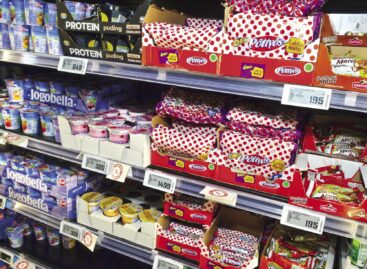Inflation – how consumers have adapted to constant changes
Andreas Christou, managing director of RetailZoom told at the Trade Marketing Club’s market research day: shoppers are no longer able or willing to spend more.
This article is available for reading in Trade magazin 2024/6-7

Andreas Christou
managing director
RetailZoom
Record-high inflation
In Hungary value sales of domestic chains grew by 16.4% on average last year, 90% of which was due to inflation and price hikes, 8% came from increased shopping frequency, and 2% resulted from volume sales growth. So while the market produced a double-digit decline in volume sales last year, domestic chains were the second best performing segment behind discounters, gaining a significant market share. RetailZoom looked at the prices of nearly 17,000 products between January 2023 and March 2024, excluding promotions, innovations and the mandatory price cap. The results are staggering: while inflation was 19% in 2021-2022, it was a record high 69% in 2022-2023.
Consumers are unable and unwilling to spend more
Price changes, including promotions and innovations, peaked at 59% in March, with prices decreasing every month afterwards. RetailZoom examined how much more customers spent on each store visit (given the average price change). While at the beginning of 2022 shoppers tried to keep the extra spending below 10%, it reached 20% when price rises peaked. This was the point when shoppers had enough: despite inflation slowing down in June and July, shoppers cut back on spending and by December 2023 extra spending was only 6.6% per purchase.
In contrast to the negative developments in 2023, the opposite trend has been observed for domestic chains and small shops. In the January-March 2024 period they realised a huge growth in value sales, coupled with an increase in unit sales. The average basket value is 5% higher than a year earlier, having reached HUF 5,000. On average loyalty card holder customers spend more than HUF 17,000; the same figure for customers without a loyalty card is less than HUF 12,000. Perhaps the most striking figure is still the frequency of purchases: while in 2021 the average number of purchases per month was 2.6, this figure has climbed to 4.4 per month.
Fewer products from fewer categories ended up in shopping baskets
In terms of cost-effectiveness, the most important factor is perhaps that of promotions – 17% of which are very successful, i.e. able to generate significant additional sales, while almost 50% generate no extra sales at all. Shoppers have taken certain product categories out of their baskets, they are putting fewer products in them and have increased the frequency of purchases. 41% of loyalty card holders have downtiered and/or quit a category. The share of private labels – which has been traditionally low in domestic chains compared to multinational ones – has tripled since 2020. 17% of consumers removed half of the products from their basket, but shopping frequency has increased by 21%.
It is interesting to analyse the behavioural patterns of loyalty card holder customers. Their purchases reveal that they are also becoming more price-sensitive, and one of the main reasons for getting a loyalty card is to fight inflation. In terms of price sensitivity, the share of private label products in the shopping baskets of loyalty card holders is 27%, compared to only 16% for non-loyalty card holders. They are constantly on the lookout for promotions, spending 41% of their expenditure on promotional products, and on average they spend 67% more than the average shopper. //
Related news
There is a slice for everyone
🎧 Hallgasd a cikket: Lejátszás Szünet Folytatás Leállítás Nyelv: Auto…
Read more >KSH: in January, consumer prices exceeded the values of the same month of the previous year by an average of 2.1 percent
🎧 Hallgasd a cikket: Lejátszás Szünet Folytatás Leállítás Nyelv: Auto…
Read more >Related news
A stable compass in the Hungarian FMCG sector for 20 years
🎧 Hallgasd a cikket: Lejátszás Szünet Folytatás Leállítás Nyelv: Auto…
Read more >









